Ken Collier, legendary Detroit club DJ, discusses his career in music, the underground sound he presents, and his goals to the Black LGBT magazine Kick!
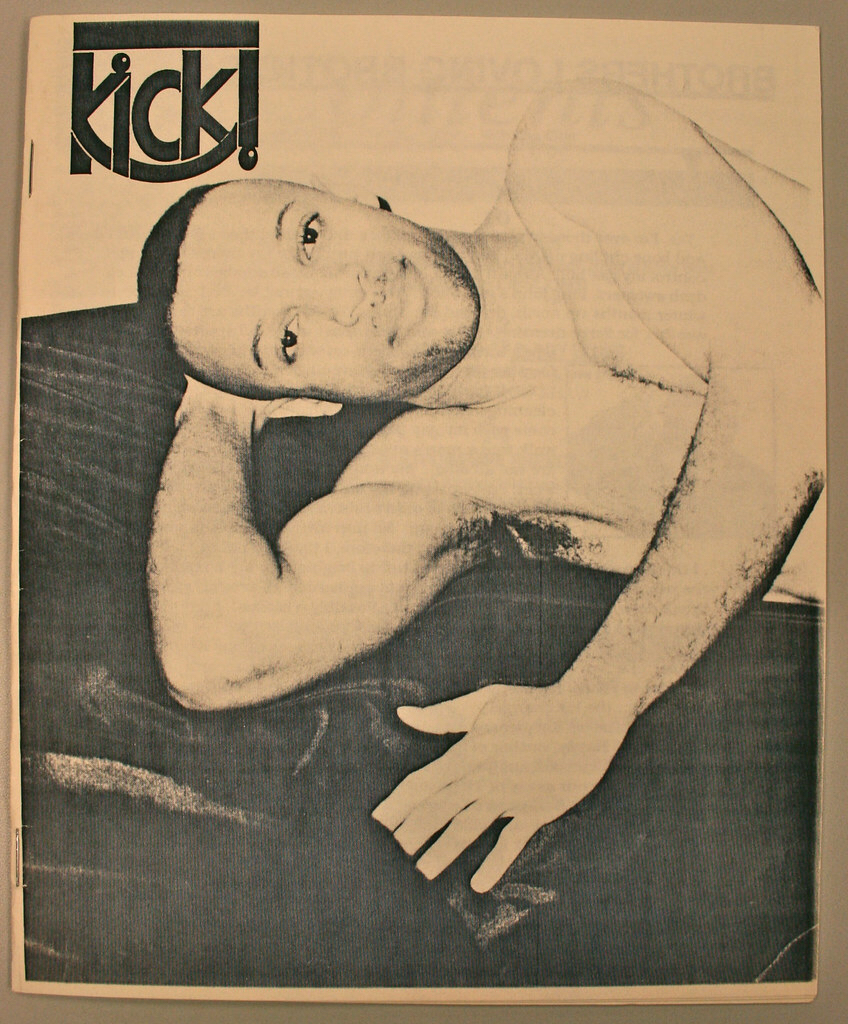
Cover of the April 1995 issue of Kick! magazine that features the Ken Collier interview.
“Legendary House: Detroit’s Own Ken Collier Talks About His Life In Music”
INTERVIEW TRANSCRIPTION
M. Terrence Samson (Interviewer): Today is Wednesday, March 15th. I am with Ken “The Godfather” Collier, local and very prominent disc jockey at Times Square at Club Heavens [sic]. My first question, Ken, is how long have you been in the music industry?
Ken Collier (Interviewee): Well, I guess this year will be my 21st year. I’ve been spinning 21 years this year. Actually, I’m already been spinning 22 years this July, so it’s my 22nd year in the music industry.
Samson: So your 22nd year this July?
Collier: This July [1995].
Samson: And how did you get started in the music field?
True Disco
Collier: I used to work with an organization called True Disco. It was run by a gentleman named Morris Mitchell and Ronaldo White, who has passed away, he was the light man at Todd’s, and myself. And we had an after hour club called The Chessmate. And that’s where I began. From there, there were many locations. Chessmate was an after hour gay club on Six Mile and Livernois and the building, as a matter of fact, is still there.
Let me see: from there, I did Studio 54 and I think I was there about six years. And after Studio 54 I did L’Uomo. And from L’Uomo I headed to the Downstairs Pub which was run by Zana [Smith].
Samson: What was that one called?
Collier: The Downstairs Pub.
Samson: The Downstairs Pub.
Collier: That’s in downtown Detroit.
Samson: Okay.
Next Stop Heaven
Collier: I was there about three or four years. I worked at — gee its across the street from the Music Institute — The Rich & Famous in downtown on [1314] Broadway. From the Rich & Famous to Bookie’s I believe was the next stop. And from Bookies, to Heaven, and from Heaven to Times Square where I both, where I currently am employed at both places, as of right now.
[03:00]
Samson: Okay. Well, while the club venues were — what were the clientele?
Underground Music and Frankie Knuckles
Collier: Some was gay, some was straight. Some was, underground, closet-type situations. [laughs] I’ve never, never really played like for cabarets or that kind of wedding receptions, that kind of thing wasn’t interested in. I was always interested in clubs and introducing the underground music, which has been there twenty-one — as long as I’ve been playing, it’s always been there. At one time it was called disco. But it was always underground. I learned it from Frankie Knuckles, he was my inspiration, when he was the DJ at the Warehouse in Chicago is where I got the idea to bring it back here. I certainly never thought that I’d ever be who or where I am in this business to this day. But I get recognition from around the country now.
I have an upcoming interview in a couple of weeks with Vibe magazine which we’ll be doing an entire page on me and the club scene. The inspiration for this article came through DJs from around the country mentioning me as the, a key person in this industry for the underground sound to bring it to where it is today.
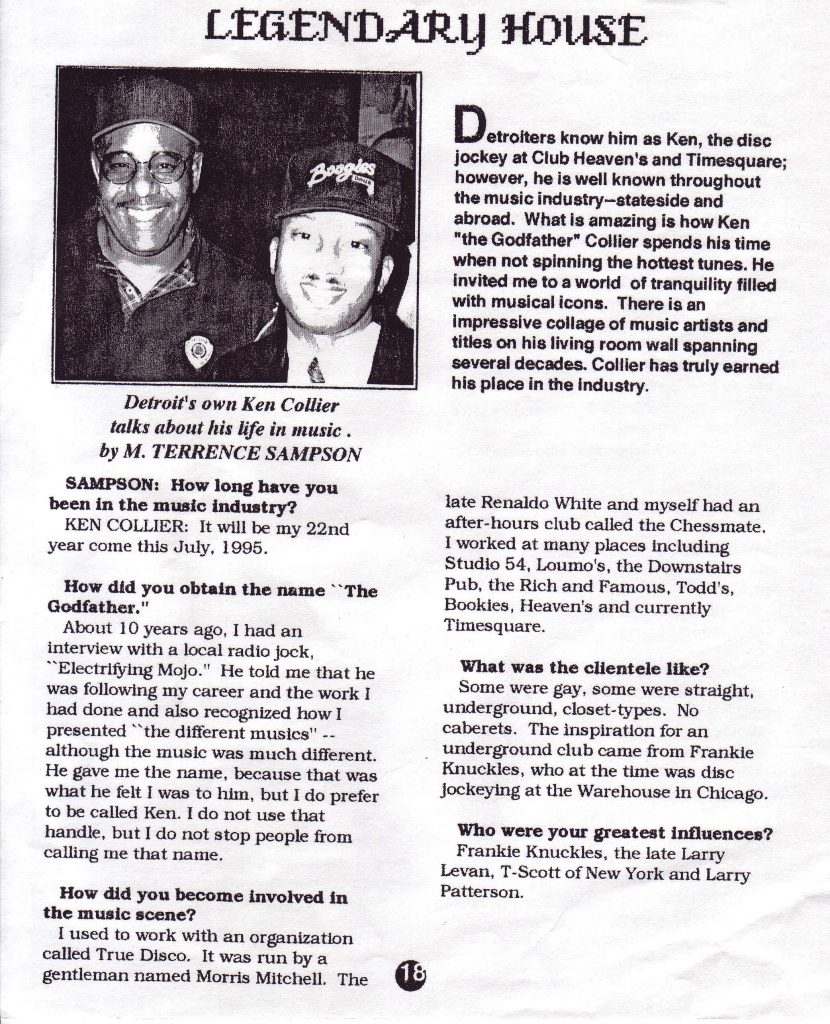
Page one of the two-page interview with Ken Collier in Kick! magazine. Scan by of Tim Retzloff.
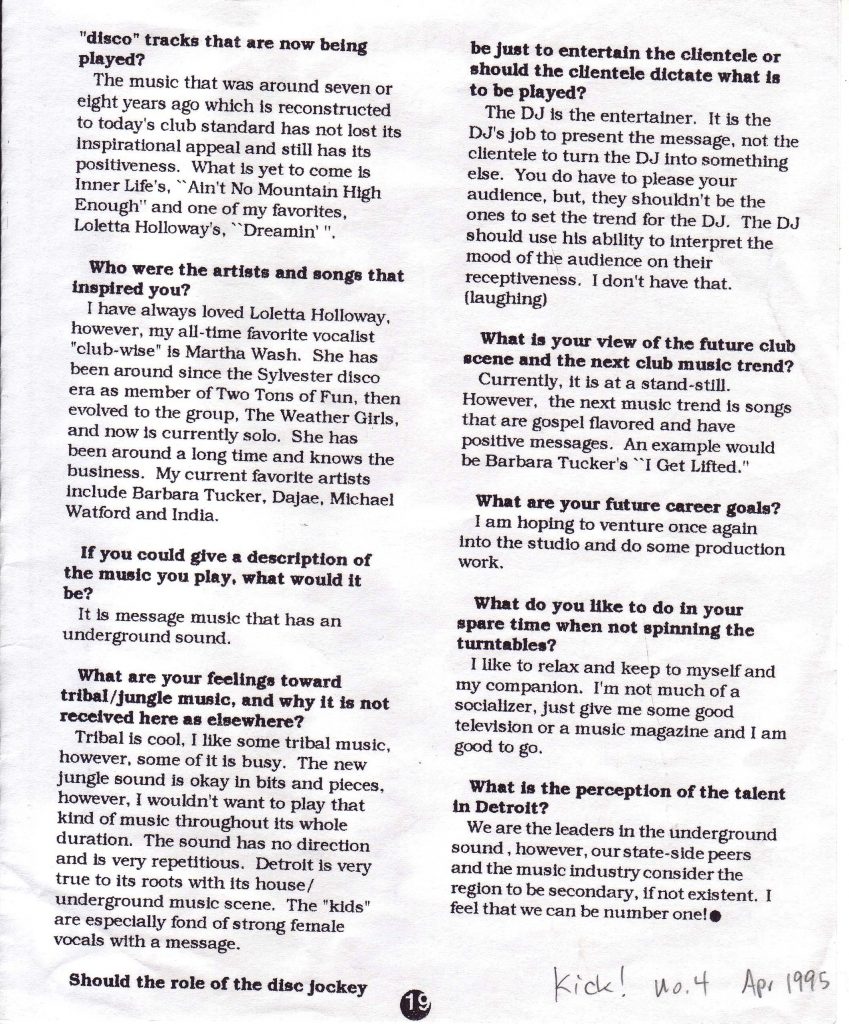
Page one of the two-page interview with Ken Collier in Kick! magazine. Scan by of Tim Retzloff.
[05:02]
New York
Samson: Did you have any other influences other than Frankie Knuckles?
Collier: Well….
[Tape stops then restarts again.]
Samson: Continuing.
Collier: I would say Larry Levan who has passed away was an inspiration from New York. Then there was Tee Scott from New York and Larry Patterson. All those fellas were inspirational to me. We all came up around the same time. In each one of our given cities we were all pretty prominent DJs. The only one that I do still keep in contact with is Frankie, as I said Larry has passed, Larry Levan and Larry Patterson. Tee Scott I don’t really hear from, I haven’t heard from in many years. But Frankie I hear from frequently. I stay in contact with him.
[06:02]
The Positive Message
Samson: What evolution or music trend do you see, from way back when it was disco to underground and, I guess now it’s like the mixture of two. I don’t know, I guess gospel was at one point, seemed it was like coming in or coming back and…
Collier: It still is. It’s coming. The music has now a very gospel flavor to it. A lot of the songs are “message songs.” In music there should be always some sort of message. If it’s just dancing or if it’s vocal tracks, it should leave you with something. Now a lot of the songs are leaving you with the positive message. I remember using an example like Barbara Tucker, “I Get Lifted,” which leaves quite a message. [Listen via Youtube.] A lot of songs are delivering like that. I think that’s going to be kind of big for the summer. In fact, I’m sure it’s going to be.
[07:11]
Disco Modern
Samson: What is, what is your opinion about the, some of the music now is coming with classic disco tracks? You see that as a positive?
Collier: Well, yes, I see it as a positive because it can introduce a lot of songs that we use to listen to seven, eight years ago, they’ve been redone in more of a today’s type sound. I think it’s very inspirational. It let the kids know what we did. You’ve been around for a while, so some of the stuff you hear and you can relate to it. There’s gonna be some stuff with “Inner Life” with Jocelyn Brown. They’re going to redo some of those songs. They are getting ready to do, “Ain’t No Mountain High Enough,” redo that…
Samson: OK. I got the Salsoul [laughs]
Collier: Then you know what I’m talking about. They are taking some of Loleatta’s [Holloway] tracks, “Dreaming,” which is one of my favorites. That’s getting ready to be redone in today’s modern technical club underground sound.
[08:28]
Powerful Lungs
Samson: Do you have any favorite artists? Maybe one period of the club music? It doesn’t have to be club music, any particular musical category, that really inspires you, moves you?
Collier: Well I’ve always loved Loleatta Holloway. All-time favorite to me. Powerful set of lungs. The only other person to me that delivers like that, club wise, is Martha Wash [Martha Washington] who has been around for quite some time from the Sylvester days to the Weather Girls to [Two] Tons of Fun and now she’s on her own. A lot of people don’t know her from those other artists but she delivers quite a message. I think she’s going to go a ways in the clubs. She’s been around a long time. She knows this business. One of my favorites. I’ll always just spin.
Hot Tracks
Who else do I like? A lot of newer people that are club artists. I think Strictly Rhythm — Barbara Tucker is one of the hottest today, in today’s music that’s leaving a message who I think is hot. I think Dajae is hot. Michael Watford always leaves a message. He is really hot. He’s on…
10:11
Samson: East West [?]?
Collier: No, Elektra, I believe it is. Yeah, Elektra. So for today, these are — I like India. India is hot. Those are kind of my favorite artists. I think, for the guy who is putting tracks together right now, Ron Trent and Chez [Damier] — what is his last, how do you pronounce his last name — his name is Anthony Pearson. It’s Chez, C, H, E, Z… I can not think of his last name, I have to get back with you. But he’s hot, he is from Chicago. He lived here for a while but now he’s living back in Chicago. He’s producing up a storm and is dropping some hot tracks lately. The last year or so he’s really dropped some nice tracks.
[11:17]
Music With A Feeling
Samson: How would you describe the music category that you play? What would be a description of the music that you play? If you can give it a description.
Collier: I don’t really know how I would describe it as far as with a meaning it’s an underground sound — I try to leave the club, the dancers with a message and if nothing then, “I danced all night.”
Samson: So there’s, what’d you say, nondescript, ‘cause some people would say just “house,” some people say “club,” some people say…
Collier: I don’t have a description. I would call it music with a feeling. If there’s a description, I don’t have one of those for it. Maybe I have to think about that. Come up with one.
[laughs]
[12:15]
An Underground Sound
Samson: In other areas — well I should say in other cities — [inaudible] in Chicago their music DJ’s play a little laid back music and on the East Coast the tribal is this big thing and jungle music. Do you think that — what would be Detroit’s, description of music or what would be the new trend set if someone’s from out of town and say, yes, this is Detroit and the kind of music they’re into is…
Collier: Oh, they would certainly say that we were underground. House more — house may not even be the right word for it, but we are certainly, I present it in an underground way. That particular word would be the perfect description. It’s an underground sound. It’s not an everyday thing that you’re hearing on the radio. It’s none of that. My definition would be underground, that is the word for what I present.
Meaning in the Music
Tribal is cool. I like some tribal, some tribal is a little busy. Jungle, the new jungle type sound is okay, bits and pieces, but I wouldn’t want to play an entire 12 inch that sounded like that all the way through. That’s repetitious and busy and noisy and has no, no direction, no, no meaning. Bits and pieces of it I would play. I’m not really fond of tribal. It doesn’t take me anywhere.
I like strong, vocal, underground sounds. Not — there aren’t really many male, good singers, most of them just do a lot of screaming. There are a few. Kerri Chandler works with a guy who does a tune called “Inspiration,” mater of fact, I think his vocal tracks, can’t think of what that guy’s name is [Arnold Jarvis] but he sounds great and his message is hot. But there are a lot of females, strong females house artists always. If she’s screaming the right note, then the message usually gets in. The kids seem to get a message from a strong female vocalist.
[14:56]
The DJ Is The Entertainer
Samson: Oh, okay. Answer this question for me. In your opinion, as a disc jockey: should the disc jockey have the power of manipulating the music for its club community or should a club community have dictation on what the disc jockey should play?
Collier: Oh no. The DJ. The DJ is the entertainer. It is your job to try to present the message. It’s not their job to try to turn you into what they want it to be. The idea is you come to dance to certain DJs, different DJs get the message across differently. The public [coughs]. Certainly you have to please your audience, but they shouldn’t be the ones that set the trend for you. That’s not their job; that’s your job as the entertainer, as the DJ.
DJs are the performers, entertainers, and you have all these folks that you have to keep dancing all night long. So you have to become a mind reader, you have to look out to your audience, see what they’re doing. They can’t come and tell you what to do. You have to have the ability to know what to do. I’ve always had that.
[Laughs].
[16:33]
Presenting Club Music
Samson: What in your opinion, how do you feel about Detroit’s responsiveness to club music, underground community, as we had…
Collier: It’s getting better and better. It was not accepted or it was not understood fifteen years ago, maybe not even ten years ago. But it’s becoming more understandable now because it’s been presented year after year after year, generations after generations. I never gave up on it. The kids, the DJ’s, that come to Heaven or come to Times Square from different cities — they go here there and there. It always makes me feel good when they said, “we just cannot present it like this.”
But none of the DJs from the DJs that I have spoke with have been in the business as long as myself, or Melvin [Hill], or my brother [Greg Collier]. In New York, the DJ that’s been there the longest, that’s doing the most now, would probably be Junior Vasquez and he has maybe had ten or twelve years. Probably the only other person would be Frankie, he goes all around everywhere. I have to believe Frankie is back living in New York. But he was commuting back from London to New York on a weekly basis, once a week.
I hope I haven’t [inaudible].
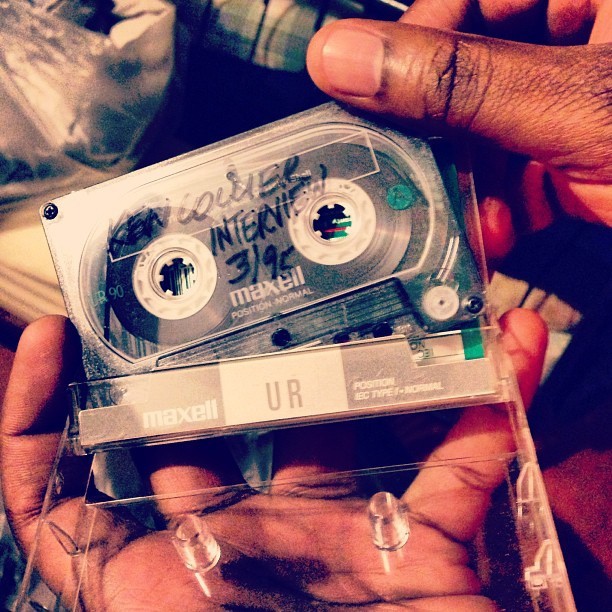
Curtis Lipscomb holds the Ken Collier Kick! interview tape.
[18:20]
Gospel Is Right There
Samson: That’s why we’re here. Okay. Where do you foresee the club community in the future? Where is it headed to — positive, any positive and negative aspects on that?
Collier: [Pauses] No, I’m not sure where it’s going. It’s really kind of at a standstill. It’s been what it is now for the last few years. Past five, six years. Personally, I’m not moving anywhere. I’m staying true to my community. As I mentioned earlier, the gospel thing I like a lot. I think that is going to go that way. If we can start having more message-type records like the gospel club records that have been coming out. I think that’s going to be an advantage. I think it’s going to be kind of big too. It seems to be doing well already. From the “Testify”s, to a new one I play called “Rejoice,” and “Rise to the Top” [?] are all leaving a gospel type message and sound. But it seems to be working real well.
Gospel music has always been a fancy of mine. I’ve always loved — I’ve always been involved with the church for many many many years. Maybe that’s why it lets me feel, let’s me feel what I feel with certain records. The way they’ve been delivered that the gospel is right there in me all the time. I’ve always had it, probably always will have it, till I die. That’s probably why I like how they are presenting it now.
[20:00]
Career
Samson: Where — do you see anything different in your career? Are you considering maybe making records?
Collier: It’s been a lot of talk about me going to the studio with different artists. I haven’t done anything in recent years other than the stuff you that you see on the wall that I have been involved with in my career. There’s been a lot of talk about me going back with different, couple groups. Kelli Hand and I were doing some work together but Kelli has left us and went to Atlanta.
So now there isn’t anything on the table, but my availability is there. Hopefully one of the people that have talked to me will come through. I’m ready. I want to get involved in the studio. I actually would like to gradually go away from the spinning and doing much more studio work in the future. I hope that is the way it will be. I am not going to spin too many more years but I hope to be in music forever.
[21:13]
Champagne, TV, and Chill
Samson: Just to venture away from the disc jockey life: what do you like to do in your spare time, Ken?
Collier: What I’m doing now.
Samson: When you’re not club DJing.
Collier: I like to sit back and drink a little champagne and watch TV and chill. I don’t socialize a lot. I get invited to many social events but when I get away from the club, I live a very quiet life. With myself and my companion.
[laughs]
Samson: Oh, okay [laughs].
A Private Person
Collier: I try not to even venture into the club that much when I’m away from it. Just so I can do other things, going to, check out a movie — TV man. Oh, I can watch TV forever. Give me some good TV and I’m all in. I do a lot of that. Read a lot of music literature. Do a lot of that. Becoming familiar what’s coming in, what’s out, what’s happening to this person. I’m a very private, a private person. It’s kind of strange too, to be a popular person and for me to be able to live a private life. Like there’s not a lot of visitors, none of that.
Samson: I would think so because you’re out there, you would want to have…
Collier: I don’t want any of it once I am away from it. I like it like this.
[22:45]
Traveling
Samson: Do you get any opportunity to go out and travel and maybe sample other…?
Collier: Well, I’ve been invited to come to many, many different cities to spin that I’ve turned down in the last couple of years. But this year I am going to venture out across the country and do some traveling, and not just to go and see what their cities are doing but to go and entertain their cities.
So Memorial Day weekend there’s been a lot of talk and it looks like it’s getting ready to happen, but I believe I’m going to be the guest DJ at Traxx Memorial Day weekend. The DJ had spoken with me on a couple of occasions and when he was here for Melvin’s [Melvin Hill] birthday party and we put a package together and I’ve talked to them a couple of times since then, so it looks like that’s going to happen.
Samson: And that DJ?
Collier: Sedrick. Sedrick from Traxx.
[23:56]
The Godfather Story
Samson: Sedrick from Traxx. Okay. [pause] You’ve answered a bunch of my questions. How did you get the nickname “Godfather”? ‘Cause Frankie Knuckles got that! [laugh]
Collier: I surely did not, did not give myself that name. What had happened, approximately 10 years ago, I was interviewed. [The Electrifying] Mojo interviewed me on his radio show. He said he had been following my career as who I was and what have you, what I have done, in the music, which was a little different for what he was doing. But the idea is that we had different types of sound but our sound seem to be working. And during that particular interview, Mojo named me “The Godfather.” He said, “I think that’s who you are in our city.” And that’s where that came from.
But I prefer to be called Ken. [laugh] I don’t use that handle at all, really. I like to be called “Ken Collier” or just “Ken.” I’ve never made people stop but I don’t encourage it either, I’m just Ken the DJ.
Samson: Well, I’m pretty sure all of our readers, your fans, do consider you as “The Godfather.” But it was just interesting to learn how did you get that name.
Collier: They do say that. That’s where that came from. He named me that.
[25:39]
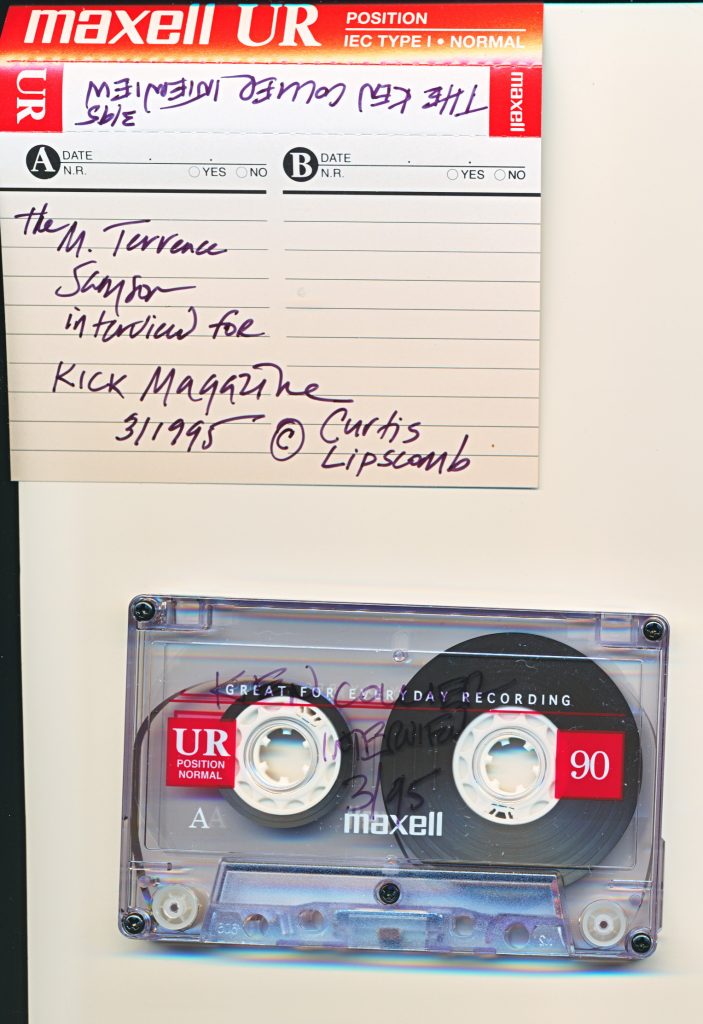
Photo of original tape cassette of interview with Ken Collier by Kick! magazine.
DRMC
Samson: Where do you see Detroit, musically, as a staple in the music industry? Do you see that any time soon or anything positive about — you’re with the D.R.M.C. [Detroit Regional Music Conference].
Collier: I think it’s going to be the leader in the underground sound, it’s definitely happening. When we had the DRMC conference last year and the fellows that came over from Belgium and from London and from Australia. Detroit city, club wise, which reminds me of the underground sound over there, it’s just, I mean it’s just exploding and they do consider Detroit as being the leader in the underground sound out of all the cities in the United States, Detroit has the leading hand and they do think that I am a leader in that field for the music that has taken it to where it’s going. There are some very impressive articles about Detroit and the club scene and they are considering us the leader.
Samson: That’s cool.
Not A Secondary Market
Collier: Unfortunately the industry considers us a secondary market because we aren’t in New York or Chicago. We aren’t the city that those cities are. But the people that really know the music industry, they certainly do not consider us secondary at all. But unfortunately these people aren’t big enough like an Atlantic Records or a Warner Brothers to present it to the public financially with all the things but they definitely consider we are the leaders. I believe that we could do nothing but keep going, till I stop.
[laughing]
[28:00]
Imports vs. Domestic
Samson: Some DJs, I won’t mention any names, have a liking for the imports versus some of the domestic music that comes out. Do you have a preference for one or the other?
Collier: Well I love the imports.
Samson: Why?
Collier: Well first of all, you can still get imports on records for openings [laugh]. If you aren’t in a pool or involved with or have on a record label’s mailing lists, getting wax is almost out of the question. The music industry has certainly gone CD and cassette crazy but the imports are still making vinyl and they’re doing a good job, it has excellent pressings or what have you.
[laughs]
I’ll probably have to leave it at that. I have no other comment. The imports. I’m an important man and I will always buy them. I would buy them domestically if they made them, but they don’t, you know, usually when a label decides to pick up one of the imports, they still put it on cassette or on CD. So you can count on getting records. Most of them, or over half of my collection, is imports. A lot of them do become domestic. Later on down the way a label will press, pick them up, and press fifty or sixty copies of them for DJs. Course if you want to buy them you have to buy them on CD or tape, if they even put it on that. Imports, yeah. I spend a lot of money on them, as a matter of fact.
[laughs]
[30:11]
Gratitude
Samson: And lastly, any final words for our readers, your fans, thoughts, opinions?
Collier: I would just like to thank everybody for supporting me down through the years and considering me one of the top fellas in the business. I’ve fortunately have not let anything go to my head that has made me, you know, a craved individual that, just you know, “I’m the one.” No, I don’t think that much of myself, but I’m glad that the public does respect me and consider me, “the one.”
And I couldn’t ask for — every time someone tells me that, I always thank them with gratitude because really they didn’t have to say that, you know. I obviously would like to thank everybody for supporting me and making me who I am today. Considering me “that guy.”
[laughs]
Samson: And I’m pretty sure they feel the same way, you are “that guy.” And I would like to thank you, for this opportunity.
Collier: I’d like to thank you for giving me the opportunity to interview with you. Anytime you need any information or what have you, I’m available.
Samson: Okay, I will take you on that offer.
Collier: You know where to find me at now.
Samson: You’re down the street. [laughs] End of tape.
©Detroit Sound Conservancy, 2020.
